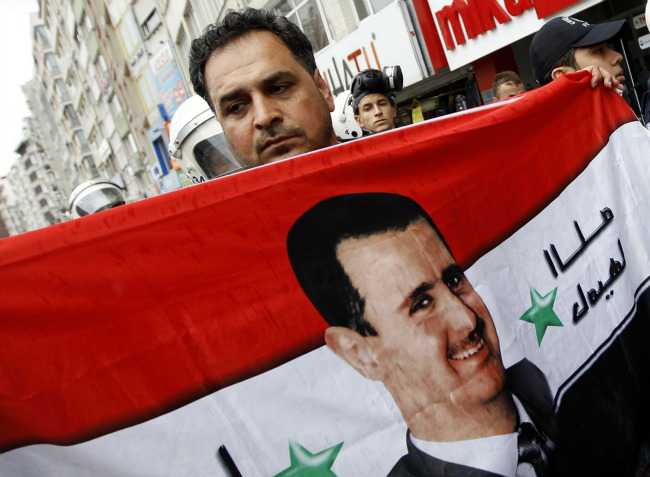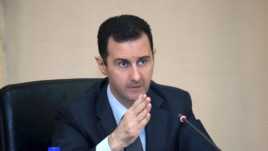
Here’s a scene that partly explains why Turkey hasn’t invaded Syria yet: In a recent parliamentary debate, Umit Ozgumus, a leader of the Turkish opposition party CHP, entered a raucous debate with Turkish foreign minister Ahmet Davutoglu, ranting, “the allegations that Assad is perpetrating massacres are lies!”
Turkey has leveled threats of invasion into Syria as the conflict has deepened over the past two years. But it has not delivered on its threat, largely because of its complex Syria policy: various considerations, including the evolving relationship between the governing Justice and Development Party (AKP) and the Turkish army, as well as unrest among the country’s Alawite population and the approaching elections, are all pulling Ankara back from military action against the Assad regime.
The AKP government has spent the last decade subjugating the once-autonomous and staunchly secular military to its power. The military has all but lost its standing with the Turkish public in the wake of ongoing court cases that accuse the army of involvement in a nefarious coup plot to overthrow the government.
Whether or not these allegations are grounded, one thing is clear: the Turkish military is no longer the most respected actor in the country. In 2007, before the Ergenekon case, which alleged that there was a hidden coup plot against the AKP government, polls showed that the Turks trusted the military more than any other institution. Now, Turks trust the presidency, a position filled by former AKP member Abdullah Gul, who has proven himself as a statesman since assuming office in 2007. Abdullah Gul has actively grown his prestige with his successful use of social media and patronage of civic initiatives. Meanwhile, the military’s luster has faded.
This also stems from the fact that the Turkish army, once feared and respected, has proven to be an empty shell. Over a quarter of the top brass of the Turkish military have ended up in jail in connection with coup plots, and arrests continue on a monthly basis. Today, the military is in no position to present itself as an institution to be feared, much less respected. In other words, the AKP has won, and the military has lost. One reason why the Ankara government is reluctant to send the military against Assad is that a victory on the battlefield would quickly allow the military to restore its image.
Ironically, the army does not want to fight against Assad either; the Turkish military is silently aware of its own weaknesses. For many years, Turkey’s military doctrine was built on the assumption that Turkey must prepare for conventional war against its neighbors. Although the military built capacities for overseas deployment following the September 11 attacks and demonstrated impressive ability in Afghanistan, it is woefully ill equipped to successfully partake in a civil war in Syria.
Analysts in Ankara estimate that the best the Turkish army can do against Assad would be to take control of a 10- to 20- mile wide cordon sanitaire in northern Syria, across the Turkish border. That would hardly be a resounding victory for the Turkish military.
What’s more, without solid NATO backing the Turkish military, though a much more powerful force than the Syrian military, would not be able to maintain its comparative advantage against the Assad regime and likely anti-Turkish insurgency led by the regime supporters. Without White House support for a unilateral Turkish campaign against Assad, even the most hawkish Turkish generals will shy away from a campaign until they are sure Turkey will not be left to go it alone.
And besides wanting to withhold a possible public relations boost to the military, the AKP has its plenty of reasons to shy away from outright war. For starters, Turkey is home to a 500,000 thousand strong Alawite community that lives mostly in the country’s southernmost Hatay province. Alawites in Turkey are ethnically related to Syrian Alawites, many of whom are steadfast in their support to the Assad regime. And many Turkish Alawites are related to Syrian Alawites through marriage and family ties. So for the Turkish Alawites, what happens in Syria does not stay in Syria. Recent demonstrations by Turkish Alawites in favor of the Assad regime have fueled these anxieties, further diminishing Ankara’s appetite for war in Syria.
And if the AKP wasn’t already skittish about the military option in Syria, the main opposition party, the CHP, has taken a contrarian stance. Many in the CHP still harbor 1970’s style anti-Americanism, opposing U.S. policies and cooperation with the U.S., as well as any sort of military action on ideological grounds.
There is also the fact that the CHP has a large Alevi base. (The Alevis, who comprise about 15 percent of the Turkish population, are not related to the similar-sounding Alawites.) But both groups take issue with the AKP’s Syria policy.
The Alevis are staunchly secular and therefore categorically opposed to the AKP’s conservative and occasionally Islamist flavor. They stand against the AKP policies, and they will be another reason for the CHP to maintain its visceral opposition to the AKP’s Syria policy.
The CHP, which has support from about a quarter of the Turkish population, now stands in the way of a more active Turkish policy against Assad. In a recent example, four CHP deputies visited Assad in Damascus in early March. In a public relations stunt, the deputies undermined Ankara with claims that the Turkish people “reject intervention in Syria and want nothing more than neighborly relations” with Assad. To which the Syrian dictator purportedly responded: “I appreciate the stance of the Turkish people and political parties, who unlike the Turkish government favor stability in Syria.” The CHP will oppose the AKP’s Syria policy, even if this means divorcing itself from reality.
Last but not least, there is the issue of Turkish Prime Minister Recep Tayyip Erdogan’s political goals. Erdogan has won three successive elections, recently breaking the record for longest-serving Turkish prime minister. Now, he has set his sights on becoming Turkey’s next president in the forthcoming 2014 elections.
Throughout his decade in power, his greatest political asset has been Turkey’s phenomenal economic growth, averaging over 5 percent annually. Erdogan wins because Turkey grows, and Turkey is growing because it is the only stable country among its European and Middle Eastern neighbors. If this virtuous cycle continues, Erdogan will win the next elections. If, however, Turkey enters a war in Syria, it could slide into the ranks of the “problem states” in its neighborhood. This would break Erdogan’s recipe for political and economic success by putting in jeopardy the more than $40 billion that comes into the Istanbul stock market annually, driving the country’s growth.
The odds are against unilateral Turkish action against Assad. Yet, at the same time, Ankara cannot tolerate Assad in power, or live with a sectarian civil war next door. Turkey’s leaders are acutely aware that war will spill over into Turkey, stoking violence between the country’s Alawites and Sunnis and tarnishing Turkey’s coveted reputation as a “stable country in an unstable region.” This would also end Erdogan’s presidential dream.



